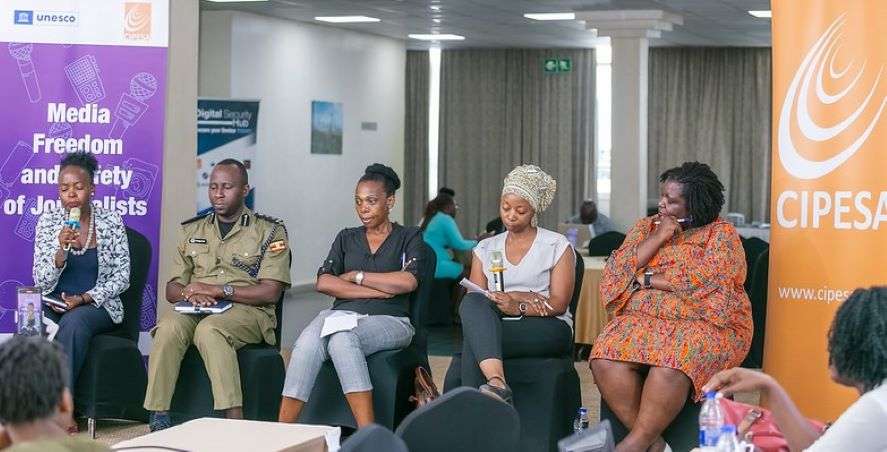By Juliet Nanfuka |
The media sector in Uganda has grown exponentially since its liberalisation in the 1990s, which saw a shift away from state-owned media to the pluralism of print media, radio and television stations and the eventual entry of digital media at the turn of the century. Yet despite this, women journalists appear to have remained on the periphery of the media industry and, in more recent times, are bearing the brunt of a society that continues to make attempts at muting them, particularly through online spaces.
The Human Rights Network for Journalists (HRNJ) in Uganda has documented a concerning rise in violations and abuses against female journalists between 2017 and 2022. Although there was a slight decrease in incidents in 2020 and 2021, there was a resurgence thereafter, with reported cases increasing to 17% in 2022 compared to 12% in 2017. These abuses have included instances of sexual and gender-based harassment of female journalists while at work and in the field, as well as attacks in online spaces.
Indeed, research shows that the attacks experienced by women journalists in online spaces include sexist comments, age, and body shaming, as well as character assassination. Further, stories related to politics triggered more attacks than other beats as perpetrators accuse journalists of being politically biased. More recent developments have seen these attacks further exacerbated by the increasing use of artificial intelligence and the ease of access to bots.
Yet, women journalists who experience abuse online rarely seek justice and often struggle to have their complaints taken seriously and properly investigated. Thus, according to a study by UNESCO and the Collaboration on International ICT Policy for East and Southern Africa (CIPESA), the full extent of online violence against female journalists remains unknown However, there are numerous illustrative cases that indicate that Technology Facilitated Gender Based Violence (TFGBV) against women journalists is a growing problem not only in Uganda, but across the continent.
At a workshop hosted in March 2024, by UNESCO and CIPESA to further insights and awareness on the State of Media Freedom and Safety of Journalists in Africa participants narrated their online experiences on trolling, attacks, threats and concerns about surveillance and limited practical skills or legal recourse in how to navigate incidents. Some participants noted that they had withdrawn from social media spaces, and limited their interactions only to closed platforms such as Whatsapp, while others indicated high levels of self-censorship in the nature of the content they posted.
Additionally, there was a common concern regarding the uncertainties surrounding various aspects of the Internet. This included discussions about the protective measures implemented by platforms, such as the prompt takedown of malicious or harmful content once reported.
Present at the workshop were 40 participants representing a mix of radio and television stations, print media and online content creators based in Kampala. Speakers at the workshop included Jan Ajwang, Projects Manager at Media Focus on Africa, Isabella Akitung, a Human Rights Policy Consultant, Jimmy Haguma, the Head of Electronic Counter Measures at Uganda Police, and Rehema Baguma, an Associate Professor of Information Systems, Makerere University and Sylvia Musalagani, Head of Safety Policy Africa, Middle East and Turkey at Meta.
Each speaker made distinct contributions to the workshop, including a call for the plight of rural-based journalists in Uganda to be recognised when it comes to TFGBV, the recognition of the impact that online attacks have not only on victims but on the broader community of existing and aspiring women journalists, and the continuing efforts of the Uganda Police in addressing technology-related affronts to women and girls in the country.
Similarly, it was noted that Meta is working on its proactive detection and removal of harmful content in a bid to improve the experiences of more women across its different platforms. However, the growing pervasive use and presence of AI amongst more users remains a concern that more users should be aware of and pursue more proactive measures to better detect its presence in misinformation and disinformation narratives.
Meanwhile, running concurrently with the discussion was a Digital Security Cafe which entailed tailored practical responses to the digital security concerns that the participants had about their phones and laptops.
This practical support served as an extension of CIPESA’s digital resilience work in Africa, which includes the provision of the Digital Security Hub at the annual Forum on Internet Freedom in Africa (FIFAfrica), the Road to FIFAfrica annual digital security campaign and an ongoing digital security assessment for human rights defenders in Uganda.
The workshop was hosted in partnership with the Media Challenge Initiative and the Uganda Radio Network. Similar workshops and Digital Security Cafe’s are planned for women journalists, media practitioners, and content producers in Ethiopia and Tanzania as part of efforts aimed at bridging this work between Women’s Day and World Press Freedom Day.

